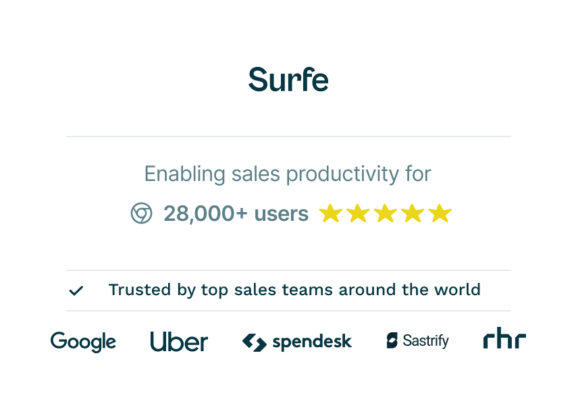Creating a Sales Playbook to Standardize Your Team’s Approach

Imagine you and your team had to learn a dance routine in 24 hours – and then perform it.
(If the thought makes you feel ill, us too).
Without instructions the whole thing would take ages to learn – and you’d probably still end up uncoordinated and, let’s be honest, probably not dancing very well.
If you had instructions, on the other hand, you’d be able to pick up the choreography quickly. Dance perfectly in sync. Perfect moves you could only dream of 24 hours ago. Maybe.
That’s exactly what having a sales playbook is like. With one, you’ll streamline onboarding, improve your team’s performance, and give customers a consistent experience. Without one…just go back to that image of you and your team dancing without any training.
Fortunately, we’re going to save you from that terrible mental image with this blog post. Here’s what we’re going to cover:
- Why Every Sales Team Needs a Playbook
- Key Components of a Sales Playbook
- How to Build Your Sales Playbook Step-by-Step
Once you’ve finished reading, you’ll know exactly how to create and distribute a sales playbook that really works. No dad dancing in sight.
Let’s get started 👇
Why Every Sales Team Needs a Playbook
First things first – do you really need a sales playbook?
The short answer is yes. Sure, you and your team might be able to get somewhere without it, but things will probably feel a bit chaotic. And rest assured, if you’re finding things chaotic then your customers most certainly are too. Not a good look.
Here’s why you should take the time to create a sales playbook:
Consistency Across the Team
With a sales playbook, your whole team has a unified strategy and a set of processes to follow. This reduces variation in performance and improves results by creating a clear, repeatable sales process.
Speeds Up Onboarding for New Hires
New sales reps have a lot to learn – and they’re probably not going to be able to keep every little detail in mind from day dot. That’s where a sales playbook comes in; newbies can quickly learn proven strategies and steps, and refer back to it when they need to.
By minimizing the learning curve, new team members will get up to speed much, much faster.
Align Sales Efforts with Company Goals
You’re not going to be successful with random acts of selling. Sorry. Taking the time to spec out your strategy, and making sure every sales action aligns with it, makes sure that everyone is working toward the same goals.
Increased revenue? Done. Entering new markets? You know exactly how you’re going to get there.
Key Components of a Sales Playbook
We’ve covered why you should introduce a sales playbook. But what does a good one actually include, prospecting and outreach-wise?
Prospecting Strategies
There are lots of different ways to find prospects. You might have great success at trade shows or networking events, maybe the marketing team’s bringing in killer inbound leads…but at some point, you’re probably going to go out and hunt for them yourself.
For the majority of sales pros in B2B, that means getting on LinkedIn. You can use the platform to identify potential leads based on roles, industries, or company size – or scope out more leads using filtering and ‘People also follow’ tools.
Best practice is to warm these leads up with social selling – whether that’s posting your own meaningful content or engaging with conversations in the comments section – and then send a personalized message.
LinkedIn is great – but if that’s the only outbound channel you’re using, you’re missing out. Drumroll please…
No way – turns out we’re introducing ourselves! Surfe is a prospecting tool built for sales pros just like you. It helps sales reps find leads efficiently and makes their workflows super slick at the same time.
Surfe helps you find high-quality leads with super-advanced filtering capabilities, so you can build a list of prospects who exactly match your ICP. Tip: we also love the ‘Company Lookalikes’ tool. Simply find 5 companies who fit the bill, and then use the Company Lookalikes tool to automatically fill your list with even more.
If you’re thinking that’s it – nope. Keep reading.
Finding and Verifying Contact Information
So, you’ve got a list brimming with opportunity. Next, Surfe will quickly populate it with accurate email addresses and phone numbers. Say goodbye to switching between a million different providers – Surfe aggregates the best of the best and uses them to find the right b2b contact details for you. It then uses clever AI tech to make sure everything is accurate and verified.
It’s worth noting that even if you found your list on LinkedIn rather than the Surfe App (traitor) (joking) you can still use Surfe to enrich it. Export your lead list from Sales Navigator with Surfe and then simply upload your CSV to Surfe app, and proceed as normal.
Even better, Surfe will then feed everything into your CRM of choice with our CRM integration. No manual data transfer, no room for human error, no twiddling your thumbs while you wait for data to pull through.
Saved time, increased likelihood of reaching the right person, and reduced bounced emails? Sounds like a winner to us – pop it into your playbook.
Using Intent Data for Personalized Outreach
Intent data reveals prospects’ behaviors and signals that they’re actively considering a purchase. This could be first-party data (what you hear from a prospect themselves – they might straight up tell you, or visit your pricing page five times in an hour) or third-party data (which you typically buy from a provider such as G2).
Tailoring outreach based on your prospects’ online activities is an important step to include in your sales playbook. It helps reps send timely, personalized emails that align with the prospect’s current needs or pain points. You’ll enjoy improved engagement and conversion rates as a result. Yes please.

How to Build Your Sales Playbook Step-by-Step
Time to put it all together. Here’s how:
Define the Sales Process
Start off by outlining every step of the sales process. From prospecting to closing, think of it as writing an instruction manual a rep can refer to no matter where they are.
Include templates or scripts for discovery calls, emails, and follow-up messages to make sure everyone follows best practice.
For example, you might put an objection-handling sheet in there, so reps have a guide if a conversation takes a trickier turn.
Outline Tools and Resources
Ok, so your readers are now intimately acquainted with your sales process. But what about the other pieces of the puzzle?
Mention the tools you use – we’ll take a guess and say LinkedIn, Surfe, your CRM, and email tracking software are all in there – and include instructions on how to use these tools effectively. There’s no point in having a rep waste hours on your CRM every day because you haven’t trained them properly.
Define Key Metrics to Measure Success
A good strategy never stays still – you’ll be constantly updating it depending on how your reps are performing out in the world.
To figure out what’s working and what’s not, you’ll need to track KPIs such as:
- Email open rates
- Response rates
- Number of qualified leads generated
- Conversion rates from leads to closed deals
KPIs are also important to make sure every rep knows which metrics they should focus on. After all, if you want them to improve they’ll need to be able to gauge their own performance.
Use Case Scenarios
You’ll want to include real-world examples of different scenarios, and how to handle them.
For example, this might include how to engage with a cold lead for the first time, or what happens if a warm lead suddenly disappears on you.
It should also encourage reps to practice through role-playing, using the playbook as a guide to refine their skills.

Making Sure the Sales Playbook is Followed by the Entire Team
Writing the sales playbook is one thing – making sure people actually use it is another. You don’t want all your hard work to go to waste, do you?
Regular training and updates: hold regular team training sessions and you’re leading by example. Everyone will stay up-to-date on the playbook – and have the information they need top of mind. Make sure you’re updating the playbook regularly based on performance data and feedback from the team.
Accountability and performance tracking: your CRM is your best friend here. Use it to track if reps are following the playbook. It’s nice to pair CRM tracking with peer reviews, so you can see in person (or at least over a call, if your company’s remote) how your team members are doing. You can then share feedback based on playbook guidelines.
Incentivize team members: offering incentives for team members who closely follow the playbook and achieve great results is a great way to motivate your team. You’ll also want to regularly recognize and reward reps who demonstrate they know the playbook inside and out.
Measuring the Impact of Your Sales Playbook
The playbook’s written, and everyone’s using it. Next up, you need to check if it’s working. Keep an eye out for:
Increased efficiency: when everyone follows a standardized approach, your team won’t waste time on trial and error. If your sales cycle length reduces, and you increase the number of qualified leads you’re generating, you can give yourself a pat on the back for efficiency.
Improved win rates: consistency leads to better closing rates, as sales teams follow a proven, optimized process. Keep an eye on your lead-to-customer conversion rates, and your overall revenue growth per sales rep to make sure everything’s on track.
Better team collaboration: a shared playbook encourages your team to collaborate by sharing insights and learning from each other. Internal chat activity or team meetings are good indicators here. You can also track cross-team performance – is it on the up?
Let’s Wrap It Up!
Woah, did I just see you do a pirouette?!
Whether you’re in sales pro mode or you’ve got your dancing shoes on, a playbook is going to work wonders for you and your teammates: you’ll be more in sync, comfortable pulling off the trickiest of performances, and able to bring new starters up to speed quickly.
See you on the dancefloor.

Got a present for you
You can try Surfe out for free. Yes, really.
Told you it was good.
FAQs About Creating a Sales Playbook
What Is A Sales Playbook?
A sales playbook is a guide that outlines your company’s sales process, tools, strategies, and best practices for the entire team. Think of it like a recipe that helps sales reps follow a consistent approach – whether they’re prospecting for leads, closing deals, or onboarding new hires. Having a playbook makes sure that everyone is aligned, which helps improve performance, standardize communication, and boost results. Plus, it speeds up the onboarding process for new team members and keeps everyone working towards the same company goals.
Why Does My Sales Team Need A Playbook?
Your sales team needs a playbook to streamline processes and create consistency across the board. Without one, things can quickly become disorganized, leaving your team and your customers feeling confused. A sales playbook provides a standardized way to approach everything from prospecting to closing deals, ensuring that new hires get up to speed quickly and everyone knows exactly what they’re working towards. It also makes it easier to align sales efforts with your company’s overall goals, meaning you’ll hit your targets faster.
How Do I Create A Sales Playbook?
Start by outlining every step of your sales process, from prospecting to closing. Include templates, scripts, and best practices for each stage to ensure everyone on your team is on the same page. Be sure to mention the tools your sales team will use – CRMs like Hubspot and prospecting software like Surfe, for example, and define key metrics to measure success. Lastly, build use-case scenarios and role-playing exercises into the playbook so reps can put theory into practice. Don’t forget to update your playbook regularly based on feedback and performance data.
How Can I Make Sure My Team Follows The Playbook?
Ensuring your team follows the sales playbook comes down to accountability, regular training, and incentivization. Use your CRM to track how closely reps are sticking to the playbook, and pair that with peer reviews to provide more personalized feedback. Hold regular training sessions to keep the playbook top of mind and updated. Finally, offer incentives to motivate team members who demonstrate deep knowledge of the playbook.


